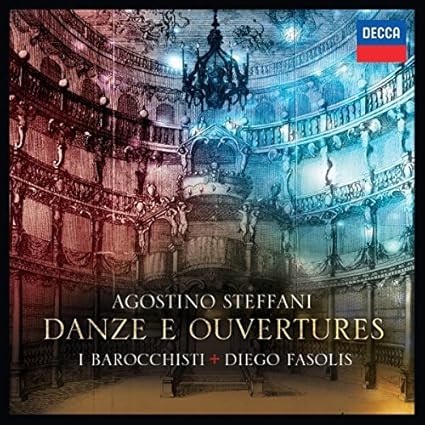Program: #13-45 Air Date: Nov 04, 2013
To listen to this show, you must first LOG IN. If you have already logged in, but you are still seeing this message, please SUBSCRIBE or UPGRADE your subscriber level today.
The Swiss conductor Diego Fasolis gives us two discs inspired (and featuring) the work of Cecilia Bartoli celebrating this underrepresented contemporary of Corelli.
NOTE: All of the music on this program is from two recent releases dedicated to the work of Agostino Steffani (1654-1728). Both are on Decca Classics and feature Cecilia Bartoli, I Barocchisti and the Coro della Radiotelevisione Svizzera conducted by Diego Fasolis:
http://www.deccaclassics.com/us/cat/4785336
I. Stabat Mater (Decca B0018947-02).

1. Stabat Mater Dolorosa
Cecilia Bartoli, I Barocchisti, Diego Fasolis
2. Beatus Vir
Coro della Radiotelevisione Svizzera, I Barocchisti, Diego Fasolis
3. Non Plus Me Ligate
Cecilia Bartoli, I Barocchisti, Diego Fasolis
4. Triduanas A Domino
Coro della Radiotelevisione Svizzera, I Barocchisti, Diego Fasolis
5. Laudate Pueri
Nuria Rial, Yetzabel Arias Fernandez, Coro della Radiotelevisione Svizzera, Salvo Vitale, Daniel Behle, Julian Prégardian, Franco Fagioli, I Barocchisti, Diego Fasolis
6. Sperate in Deo
Nuria Rial, Yetzabel Arias Fernandez, Salvo Vitale, Coro della Radiotelevisione Svizzera, Julian Prégardian, I Barocchisti, Diego Fasolis
7. Qui Diligit Mariam
Coro della Radiotelevisione Svizzera, Salvo Vitale, Cecilia Bartoli, Franco Fagioli, I Barocchisti, Diego Fasolis
II. Danze e Overtures. (Decca B0018948-02).

Orlando Generoso
1.
Ouverture
2:42
2.
Menuet
1:01
3.
Prélude - Très viste
0:22
4.
Gavotte
0:32
5.
Menuet
1:13
6.
Bourrée
0:32
7.
Gigue
0:52
Marco Aurelio
8.
Sinfonia
1:57
Henrico Leone
9.
Ouverture
2:44
10.
Air Grave
2:17
11.
Prelude pour les démons
0:18
I Trionfi del Fato
12.
Ouverture
3:41
Le rivali concordi
13.
Sarabande
1:37
Tassilone
14.
Sinfonia
4:00
Niobe, regina di Tebe
15.
Ouverture
3:51
16.
Ritornello tiberino
0:56
17.
Terremoto
0:41
18.
Marcia di Creonte
0:42
La lotta d'Hercole con Acheloo
19.
Ouverture
2:18
I Trionfi del Fato
20.
Les ombres
4:06
Le rivali concordi
21.
Ouverture
2:43
Henrico Leone
22.
Chaconne
3:08
Briseide
23.
Ouverture
3:03
Orlando Generoso
24.
Gavotte en rondeau
1:19
La Superbia d'Alessandro
25.
Ouverture
1:43
26.
Air tres vite
0:45
27.
Menuet
0:46
28.
Gavotte
0:50
29.
Air tendre
0:57
30.
Air vite
1:00
Alicibiade (La libertà contenta)
31.
Ouverture
3:33
32.
Gavotte
0:34
33.
Passpied
1:10
34.
Gigue
1:20
Servio Tullio
35.
Sinfonia
2:24
I Trionfi del Fato
36.
Sarabande
2:16
37.
Premier Rigaudon - Second Rigaudon
1:24
Niobe, regina di Tebe
38.
Gavotta
1:16
La lotta d'Hercole con Acheloo
39.
Nymphes I
1:45
40.
Nymphes IIa
0:51
41.
Nymphes III
1:21
42.
Nymphes IIb
Amor Vien Del Destino
43.Introduzione al dramma
Coro della Radiotelevisione Svizzera, I Barrochisti, Diego Fasolis
Total Playing Time: 1:15:07
Agostino Steffani was an important Italian composer of vocal music from the late seventeenth and early eighteenth centuries. His chamber duets, operas (generally written in the bel canto style), and sacred works constitute his finest efforts. Steffani was born in Castelfranco, near Venice, on July 25, 1654. He served as a choirboy at the Basilica of St. Anthony in Padua from 1664-1667 under maestro di cappella Antonio dalla Tavola, who likely gave him instruction in music. By age 11 Steffani was regularly appearing in operas and concerts, and a year later was taken to Munich at the behest of the Elector Ferdinand Maria of Bavaria.
Young Steffani sang in operas and in church services there while receiving excellent musical education under the guidance of the maestro di cappella of the Elector's Court, Johann Kaspar Kerll. By age 14 Steffani was taking organ lessons from Kerll, but rarely appearing as a singer anymore.
In 1672 he traveled to Rome to study composition with Ercole Bernabei. During his nearly two-year stay there, Steffani produced Psalmodia vespertina, a collection of Psalm settings, and a Magnificat. Shortly after Steffani's return to Munich in 1674 he was appointed court organist.
In 1680 he was ordained a priest and a year later appointed court director of chamber music by the new Elector Maximilian II Emanuel, whose father Ferdinand Maria died in 1679. Steffani would also take on duties as a diplomat with neighboring courts. In composition he remained quite active, too: having written his first opera Marco Aurelio in 1677, he composed his next four, which included Servio Tullio in the period 1685-1688, all premiered at the busy Munich Court.
Steffani left Munich in 1688 to work at the Hanover Court, where he spent 15 years as kapellmeister and diplomat. He composed several successful operas during his tenure there, including Orlando generoso (1691).
In 1702-1703 he produced a fine collection of chamber duets at Hanover, after which he accepted a post at the Düsseldorf Court of Johann Wilhelm, Elector Palatine. Thereafter Steffani composed very little. He was elected Bishop of Spiga in 1706 and apostolic vicar for Northern Germany three years later. He focused most of his energies on church matters in his later years, though he did manage to write a few works, including the Stabat Mater (1727-1728), his favorite composition. He died in 1728 of apoplexy.
© Robert Cummings, All Music Guide
Composer Info
Agostino Steffani (1654-1728), Cecilia Bartoli
CD Info
Decca B0018947-02, Decca B0018948-02